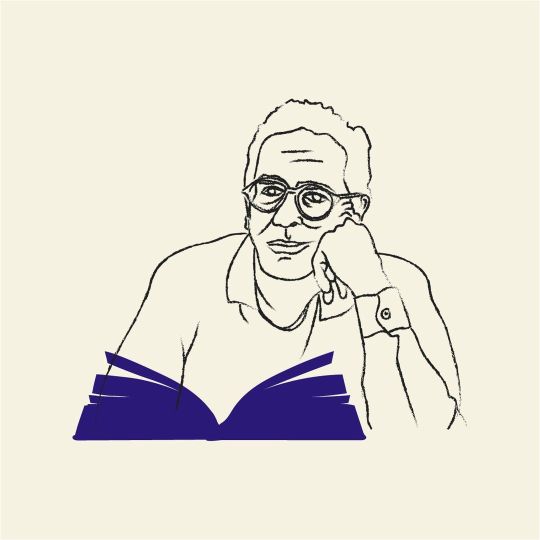#césar aira
Text
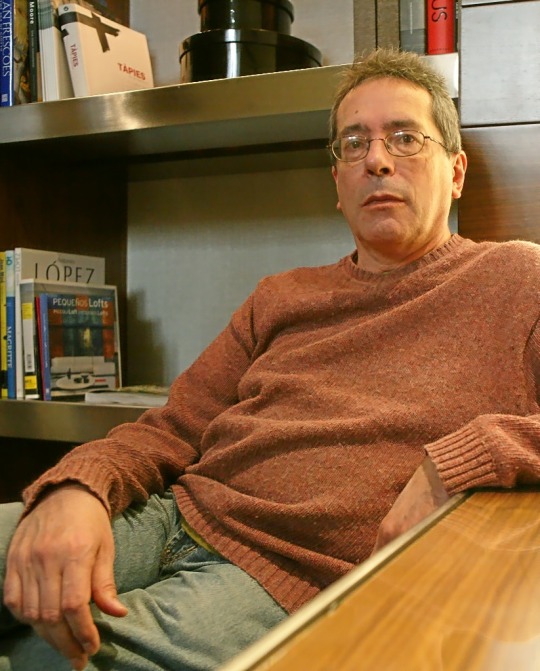
César Aira
He has published more than 100 novels, gives his work away, and his surrealist books have a massive cult following. Now Argentina’s favourite rule-breaker is tipped for the Nobel prize
Afew years ago when Patti Smith played at a cultural festival in Denmark, she told the crowd that she was happy to be playing in the presence of one of her favourite authors. It was said she had only agreed to play the festival because the author, César Aira, would be in the audience. Aira, although celebrated in his home country, Argentina, was little known outside Latin America until he was discovered in 2002 by the Berlin-based literary agent Michael Gaeb, who was enchanted by his unconventional, surrealist books, which shift atmosphere, and even genre, from one page to another.
At first it proved difficult to sell Aira’s novels to a wider audience. “The fundamental problem when promoting César’s work is that the editor always asks: ‘What is the novel about?’” Gaeb told me. “And in the case of César, it’s not easy to answer that question.”
Gaeb has since sold Aira’s books in 37 languages. At the start of October last year, the English betting site Nicer Odds named Aira as a favourite for the Nobel prize in literature, slightly ahead of candidates such as Haruki Murakami and Salman Rushdie, who have appeared more regularly on such lists.
“I already know that every October, until my death, I’m going to have to put up with that.” Said by any other writer, this would come across as a humble brag. But Aira doesn’t seem to be the kind of person who appreciates disrupting events. “Sometimes the candidacy is useful to me,” he said, laughing. “For instance, now we live in a more luxurious apartment, one a little beyond my circumstances. And they rent to me because they see that I am a candidate for the Nobel.”
His apartment is located just five blocks from his office, which in its turn was the house where he lived for more than 40 years with his two children and his wife, Liliana Ponce, a poet and a scholar of Japanese literature. The recent move took place because Ponce has an illness that affects her mobility, and the new building has an elevator.
Aira, who does not speak to the local press and whose interviews with foreign media are usually short and conducted via email, rarely leaves Flores, a lower-middle-class neighbourhood that’s best known today as a textile hub for the clothing stores in wealthier areas of the city. Early in his career, Aira developed a method called the fuga hacia adelante (something like “forward flight”), which consists of writing a few hours a day and never looking back to edit until he reaches the end of a tale. “I revise much more than I did before,” casually demystifying what is perhaps the fact most repeated about his work. “I think that I’ve become more demanding. Or else I’m writing worse than before.”
The novels were – and sometimes still are – written in neighbourhood bars, cafes and even fast-food joints, such as McDonald’s or Pumper Nic, a now-extinct Buenos Aires chain. “It began when my children were small,” he said. “If I had a bit of time, I escaped, and I went to write. But after the pandemic, the bars and cafes started to fill up a lot. And there’s the issue of the telephones. If at a neighbouring table two people are conversing, it’s possible to ignore them. But if there’s just one person talking on the phone, it’s as if they’re speaking with you. It’s horrible!”
Aira was born in Coronel Pringles, in a small town in the south of the province, 300 miles from the capital. “I was thinking just now of my first memories of childhood because they are of the revolution of 1955,” he said – the year Juan Perón was removed from power by a coup for the first time. There was only one cinema, and television had not yet caught on. But the town had two well-stocked public libraries. “When I was still a teenager, I was already reading Joyce, Proust and Kafka,” Aira said. His precocity was also stimulated by an amateur public education in which classes were taught not by specialised professors but by volunteers with gigantic private collections of books. There were doctors who taught philosophy classes (“in those days, doctors were humanists”) and lawyers who taught history. “I didn’t have that kind of bureaucratic education where the teacher knows more,” he said. “It was something a lot freer.”
When he was about 14 years old, Aira met Arturo Carrera, a friend who, like him, would become a nationally recognised writer. Aira dedicated himself to prose; Carrera, poetry. The friends tried to stay up to date with the literary world by getting hold of magazines that were based in the capital. One of those publications, Testigo (Witness), held a contest. Carrera sent a few poems, and Aira sent a story. They both came out winners.
At the time, the majority of promising secondary school students in Coronel Pringles continued their university studies in Bahía Blanca, a city 75 miles away. “Law was the only graduate course they didn’t have,” Aira said. He told his parents he was interested in a law degree and moved to the capital. “I wanted to come for the art galleries, the cinemas,” he said. For two years, he studied law at the University of Buenos Aires, and then he transferred to the department of literature.
Testigo folded before it could publish Aira’s winning story. But one of the judges of the award, the novelist Abelardo Arias, wrote to congratulate him. Aira and Arias began a correspondence, and soon Aira showed Arias a manuscript. Arias loved it and passed it on to the publisher Galerna, which agreed to print it.
“It was a big thing, even more so for a young person of that age,” Aira said.
One day, walking aimlessly through the streets of the city with a friend, he came across a building he knew. “Here, in this building, an editor wants to publish a novel of mine,” he told her. “Let’s go up.” When he arrived, he asked to speak with the person responsible for his book. Then he asked for the manuscript back: ��I don’t want to publish it any more.” The editor was astonished.
I asked Aira why he’d acted like that. “Just because,” he said. He shrugged and laughed. “I wanted to impress her.”
To write all day long without revising until you reach the end of a story produces an obscene quantity of books. Nobody I met in Buenos Aires ventured to pin down exactly how many volumes Aira has published. César Aira, un catálogo (César Aira: A Catalogue), organised by the writer and lawyer Ricardo Strafacce, is the most notable effort to itemise his work. Launched in 2018 with the aim of helping the uninitiated, the catalogue reprints one page from each of Aira’s books. The catalogue was commissioned by his publisher in part to commemorate his 100th book (Aira likes round numbers), but in the time the catalogue took to reach the printer, Aira had already written two more.
When I sat with Strafacce in the Varela-Varelita bar in Buenos Aires at the end of a November afternoon, he was still indignant with the catalogue’s publisher, who he said had made changes without telling him. For instance, the publisher had edited the date of publication for the Aira story El hornero (The Ovenbird). “I’m furious,” he said. “You can talk to [the editor]. I don’t give a shit.” He complained about another small modification: in the biographical information for one of the titles, to his mention of Madrid, the editor had added “Spain”. In Strafacce’s eyes, the detail made him seem like an idiot, a “boludo”.
“Don’t writers get worked up about the most incredible minutiae?” said Francisco Garamona, the editor in question. With a cigarette in one hand and a glass of soda in the other, he explained that he’d merely used the version of El hornero that Aira himself had authorised, rather than the one in circulation, which was pirated. He was sitting on a sofa in La Internacional Argentina, his bookshop, where he also operates his publishing house, Mansalva. Today, Mansalva probably publishes the most titles by Aira. “There he is, and here are more, here’s another, and here,” Garamona said as he counted the shelves in the bookshop. “One, two, three … seven. Seven niches of just Aira.”
In a way, the decor reflected Garamona’s multifaceted career; in addition to being an editor and a bookshop owner, he is a musician, a film-maker, a poet and the former owner of an art gallery. Today he is also one of two editors whom Aira defined for me as “official”. The other is Damián Ríos, from the publisher Blatt & Ríos.
The honour of “official” editors must inspire some pride in Ríos and Garamona, because Aira has worked with more than a few. His extensive body of work is decentralised in dozens of editorial houses, the vast majority of them tiny, which makes him an author at once ubiquitous and elusive. In this context, it’s not difficult to understand how a controversy like the one with El hornero came about. Aira must be one of the few writers in the world, maybe the only one, to sell 25,000 copies of one title and at the same time launch other titles in much smaller print runs. He has never charged royalties or advances for the small publishing houses in Argentina. “That was the agreement I made with Michael [Gaeb],” Aira said. “I don’t meddle with the world. And he doesn’t meddle with Argentina. In Argentina, everything is free.”
Aira’s strong cultural presence today conceals the stuttering start of his career. “For many years, this was the only proof I was a writer,” he said, showing a handful of yellowing pages, the nucleus of a book without a cover. His voice shook, this time, emotion had truly moved him. In his hands was a copy of Moreira, considered by some to be his first published novel. In the background, an atmospheric combination of dissonant chords and piano notes faded away. “I only listen to Morton Feldman these days,” Aira said. He added that he’d recently made an exception to listen to Now and Then, a “new” song by the Beatles completed thanks to help from artificial intelligence.
After going up to the office of the publishing house Galerna in 1969, in that half-impulsive gesture to ask for his manuscript back, some years went by before Aira had a chance to publish again. Moreira was supposed to come out in 1975, but was delayed. The editor of the book was Aira’s friend Horacio Achával, owner of the publishing house Achával Solo. In 1976, there was another military coup in Argentina. “Horacio was a political militant and had to go away,” Aira said. “He took off. He went to Uruguay.” The copies of Moreira, still without a cover, were left stranded in a warehouse. Years later, Achával returned to the country and finalised the cover. The book was officially launched in December 1981, just weeks after Ema, la cautiva (Ema, the Captive), which came out from another publishing house in November 1981 and today disputes with Moreira the title of Aira’s official debut.
Strafacce told a different story. “Moreira was printed in June 1975,” he said. “The money ran out, and there wasn’t enough to print the cover because in the same month, there was a financial crisis and a bank run here in Argentina.”
Aira published a few books in the 80s, but according to Sandra Contreras, who founded a small publishing house that published him throughout the 90s and 2000s, it was not until 1990’s Los fantasmas (Ghosts) that he accelerated his production. At the time, she said, he also spoke more explicitly of a new phase, “the beginning of the regular publication of his novelas and novelitas”. Aira was the first author to be published not only by Contreras’s publishing house but also by Mansalva and Blatt & Ríos in the early 00s.
In the 90s, small publishers like these were rare. Garamona said that this began to change in 2001, when after almost a decade of one-to-one parity between the Argentine peso and the US dollar, the local economy went through one of the worst recessions in Latin American history. Importing books became expensive. And so, after spending years favouring authors from Spain, local bookshop owners finally had eyes for Argentine literature.
When Gaeb first encountered Aira’s work in Guadalajara, in 2002, Aira had already begun to occupy his paradoxical central position at the margins of the culture. “He is a writer who exists in different fields, at different levels,” the fiction writer and critic Alan Pauls says, from his Berlin study, in a conversation over Zoom. “On the one hand, he has quite a lot of popularity. And on the other, he remains a niche writer, a cult writer. We still think of him as a writer of the avant garde, a manufacturer of very sophisticated objects. He’s someone who occupies the centre to his regret, not because he looked for it.”
To get hold of Moreira today isn’t easy – on the site Mercado Libre Argentina, in mid-December, there was a copy going for about $1,200 (£950). On the cover that for years remained unfinished, there is a monstrous, saturnine figure riding a yellow horse. Beneath the image, the first sentence of the novel prominently appears: Un día, de madrugada, por las lomas inmóviles del Pensamiento bajaba montado en potro amarillo un horrible gaucho (“One day at dawn, through the unmoving hills of Thought, mounted upon a yellow colt, there descended a horrible gaucho”).
In Spanish, El Pensamiento can refer to both the abstract noun, and the village close to where Aira was born and spent his childhood. The phrase gives a taste of the kind of mixture harboured within the novel. Evoking Juan Moreira, a folkloric knife-fighting hero of the Argentine Pampas, the book narrates a gaucho-esque pantomime, shot through with philosophical allusions and images from dreams. In Moreira, one can already recognise the multifaceted and frenetically imaginative style for which Aira would later be known. But the Airean machine still seems to just be getting started: there is a heavy self-consciousness that is absent from the books that follow. In these later works, his prose is limpid and inviting. Here is the start of El mago (The Magician), published almost exactly 20 years after Moreira:
In March this year, the Argentine magician Hans Chans (his real name was Pedro María Gregorini) participated in a convention of illusionists in Panamá; the event, just as the invitation and promotional leaflet described, was a regional meeting of prestigious professionals, a preparation for the great world congress the following year, which was celebrated every 10 years and this time would take place in Hong Kong. The previous one had been in Chicago, and he had not gone. Now he planned not only to participate, but also to establish himself as Best Magician in the World. The idea was not crazy or megalomaniacal. It had a foundation as reasonable as it was curious: Hans Chans was a genuine magician.
Aira takes this magical premise seriously, drawing from the dilemma a tale both comic and – in its exploration of the complex relations between being and seeming – densely philosophical. Hans Chans has the gift to be an illusionist, but not the vocation. He is too self-indulgent to dedicate himself to the profession. The narrator writes: “Maybe, paradoxically, the advantage he had played against him and condemned him to mediocrity.” Without patience for the theatre of magic, Chans limits himself to drawing handkerchiefs from wine glasses, and things of that sort.
It would not be unfair to read El mago as an allegory for the career of Aira himself: of someone who has the gift of writing but for whom the most deeply rooted conventions of the profession seem meaningless. Just like Hans Chans, the author is aware of his gift. Aira is affable and courteous, but he is far from being modest. (Modesty, faked or not, is another convention of the profession.) About the manuscript he asked to take back from Galerna in 1969, he said: “It was better than anything else that was published at the time.”
He has never been afraid to throw darts at other writers. When we spoke, he was disdainful of Roberto Bolaño, saying he had read only one novel by the Chilean author, which he found “terrible”. Aira also said that the great Argentine novelist Juan José Saer had once warmed to him, when he was young and starting out, but then became envious when Aira started getting more attention. In 1981, shortly before Moreira was finally published, Aira wrote an essay titled Novela argentina: nada más que una idea (The Argentine Novel: Nothing But an Idea), which mounts a general attack on literature of the period. The essay begins:
The current Argentine novel, beyond a doubt, is a stunted, ill-fated species. In general terms, what defines a poor novelistic product is the poor use, crude and opportunistic, of the available mythical-social material. In other words, the meanings that dictate how a society lives at a given historical moment. But the literary transposition of a reality demands the existence of a very exact passion: that of literature. And a rapid, provisional survey, not at all exhaustive, of Argentine novelists reveals that they have not read deeply, and show a complete absence of that passion along with its epiphenomenon, talent.
Aira, who had not even published a novel at that time, sticks his scalpel swiftly and mercilessly into a series of authors, most of whom have been more or less forgotten. The essay, though, is remembered these days for Aira’s attack on Ricardo Piglia, who, until his death in 2017, was a kind of public rival to Aira, at least in terms of the very different literary forms they espoused.
Pauls linked Aira’s attacks at the start of his career to his ambition to reconfigure the Argentine novel. “When he emerges in the literary environment, he knows perfectly well the writers he has to tussle with,” he said. For Pauls, Aira disturbed the paradigm of a certain progressive Argentinian literature, a literature of the left, very masculine and politically committed. “Something that literary school could not stand, for example, was a certain kind of work with frivolity, with the banal, with the superficial,” Pauls said.
Aira’s style crystallised very early on. Even if Moreira is not at the level of his next books, there is no clear sense of progression in Aira’s trajectory. Maybe for that reason, none of the readers could point to a favourite work.
Aira said he will have two new novelitas ready soon. He said he plans to give one to Ríos and the other to Garamona. “And now I’ve been thinking, because one of them came out better than the other, more imaginative – who will I give that one to?” he said, laughing.
Aira rejects great theorising about his decision to give away books free or publish the majority with small publishing houses. “His form of publishing is part of his poetics, his resistance to editorial capitalism, his punk attitude,” Gaeb said.
Contreras classified the hyperproduction of little books for small publishers as an aesthetic decision. “Something like: it’s enough for a tale to be imagined to make it necessary to publish,” she said. “There is also a fascination for the book as a unique object.”
Pauls said he interprets this decision as an avant garde way of thinking: “If the kind of literature I make is never going to have hundreds of thousands of readers, what happens if I inundate the market with books?”
When Aira was asked if he was edited nowadays, first he said that “nobody revises anything”. Then he conceded that Ríos sometimes makes one comment or another. Ríos corroborated this, but found it hard to define the exact nature of his comments, and he made it clear that they weren’t about anything structural. Contreras said that in her day, she at most corrected the odd typo.
Garamona laughed at the notion of editing or revising a text by Aira. “He has written since he was a teenager without stopping, and has such a mastery of form and content that in the end there isn’t much left to do,” he said. “You just have to pick it up, make a good cover with a pretty design, correct two or three errata.”
Los hombrecitos con sobretodo (The Little Men in Overcoats) is the title of the novel Aira defined as the most imaginative of the two he recently finished. “What happens is that here in the neighbourhood, two blocks away, where the fire station is located, men pop out at night,” he said. “At midnight they come popping out of the ceiling. Little men suddenly appear like that, really tiny men, they all wear overcoats. And at night, I go and watch them.”
He spoke as if he were beginning a fairytale. The low, tremulous voice transiting between fine irony and rapture; the sense of humour; the erudition; the sedentary life in a dark house in the neighbourhood where he’d lived for decades, from which he generates cosmopolitan, compact stories full of metafictional layers – all of it reminds us a bit of Jorge Luis Borges.
For an Argentinian, to say a great local writer seems like or is influenced by Borges must sound absurdly lazy. But both authors start their brief, densely packed books with literary anecdotes or memories written in crisp prose. In the works of both, there are frequent essayistic digressions. Both persistently turn to the literary technique of ekphrasis. There are metafictional and metaliterary games, references to other works.
The main difference is perhaps in the intensity and direction of the narrative swerves, and Aira’s greater comfort with pop culture and genre literature. Whereas a story by Borges might take up a lost 19th-century Persian manuscript, a novel by Aira might locate it behind the balcony of a McDonald’s in Flores, pored over by an adolescent with an acne problem.
Borges was almost infantile in his complete dedication as a reader, distant from the mundane hustle and bustle of the world. Nobody had anything substantial to say about Aira’s private life either. “He likes to drink coffee and talk about literature,” Ríos said. Gaeb said that Aira sometimes seems to get along better with children. (In fact, the person about whom Aira spoke with the greatest passion, albeit briefly, was Arturito, his only grandson.)
Strafacce, his friend for more than 20 years, said he found it easier to explain what Aira doesn’t talk about. “We’re used to not speaking about politics because I’m Trotskyist,” he said. “And César is not.”
It was the week of the second round of the presidential election. A few days later, the Peronist Sergio Massa, a member of the centre-left governing coalition at the time, would be defeated by the far-right Javier Milei. “Milei is worse than Bolsonaro,” said Aira, in his only comment about politics.
That day, before going to the cafe, Aira passed through the Museo Barrio de Flores. Earlier, he had been irritated at a package from one of his foreign publishers: a box containing copies of one of his novels in Dutch translation. “They keep sending me those here,” he complained, as if sending books to the author himself were a kind of gaffe. Aira handles books with the avidity of a collector. He was mesmerised for a good while that afternoon by an edition of the French author Raymond Roussel, one of his surrealist idols, and he showed us a little purple box the size of a pack of cigarettes: a tiny special edition the Biblioteca Nacional had made of El ilustre mago (The Famous Magician), another novel of his. But for some reason, he wanted to rid himself of the box with the Dutch edition.
The Museo Barrio de Flores does exactly what its name suggests, displaying all kinds of memorabilia – old calculators and radios, paintings, newspaper clippings, political propaganda – related in some way to famous inhabitants of the neighbourhood. The definition of “famous” is broad, ranging from Perón – who lived there with his first wife – to the two preteen nieces of the museum’s director, who created a children’s library during the pandemic and appeared on the front page of the newspaper Clarín. Aira seemed at ease there. His name occupies one of the steps on the staircase by the front door. On the step above is the name of the great writer Roberto Arlt; on the one below, an advertisement for a real-estate broker.
Aira left the box of books with an employee and continued through the museum. At one point he dwelt on a framed letter written by Pope Francis, another former inhabitant of the neighbourhood. “Did you see how pretty the pope’s handwriting is? They don’t teach that in school any more, no.” He went to another room, where there was a showcase with some of Aira’s books.
When he opened the door, there was a group of ladies sitting around a big table. A class was in session. They all smiled pleasantly, focusing their attention on the author. Only the instructor of the course seemed to be younger than 65.
“What is the name of the little plane that flies near the ground?” one of the ladies asked.
“The what?” said Aira.
“The little plane,” the lady repeated, with a certain impatience, lowering her open palm toward the floor. “The one that flies near the ground.”
For a while, everyone stared at Aira, waiting for an answer. “An unexpected question,” joked the instructor awkwardly.
Aira shrugged, and we went to the corner to look at his showcase.
✔ This is an edited version of César Aira’s Magic, published in the Dial. The article originally appeared in the Brazilian magazine Piauí
Daily inspiration. Discover more photos at Just for Books…?
6 notes
·
View notes
Text
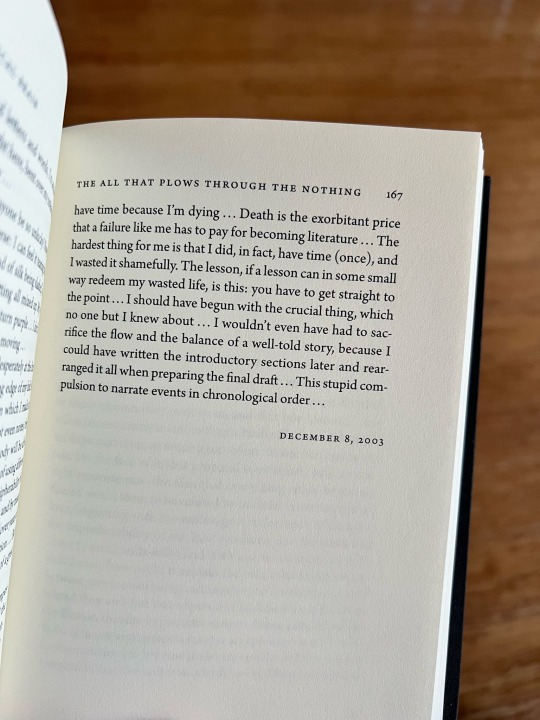
i’m reading césar aira’s short story collection the musical brain (trans. by chris andrews) and it’s phenomenal: impossibly inventive and striking.
like the end of this story, which begins as an introspective ambling from scene to scene, and ends suddenly with the narrator contemplating Death and Literature and running out of Time:
The hardest thing for me is that I did, in fact, have time (once), and I wasted it shamefully. The lesson, if a lesson can in some small way redeem my wasted life, is this: you have to get straight to the point…I should have begun with the crucial thing, which no one but I knew about…I wouldn't even have had to sacrifice the flow and the balance of a well-told story, because I could have written the introductory sections later and rearranged it all when preparing the final draft…This stupid compulsion to narrate events in chronological order…
9 notes
·
View notes
Quote
En el curso de los días siguientes les sucedieron dos cosas importantes. No cosas que fueran a cambiar sus vidas, ni siquiera de las que se atesoran en la memoria para siempre; en todo caso, fueron de ese tipo de acontecimientos que logran hacer variar el rumbo de la memoria, aunque después se borren de ella. Todo lo importante que le sucede a la memoria tiene siempre la forma del olvido más completo, de la aniquilación. En ese sentido, la vida es discreta: lo importante sucede allí donde aparentemente ha sucedido muy poco, casi nada, y a veces increíblemente nada.
César Aira, Embalse (cap. VI).
12 notes
·
View notes
Text
Aira/Márquez/Moore (Books acquired, 18 Aug. 2023)
Last week I read a 1985 Washington Post profile of the American novelist William Gaddis. The profile, by Lloyd Grove, celebrated the publication of Gaddis’s third novel Carpenter’s Gothic. In the profile, Grove paraphrases literary critic Frederick Karl’s 1985 essay “The Mega-Novel” in the following way:
Karl argues that unlike “categories of Jewish novelists, gays, Black writers [and] female…
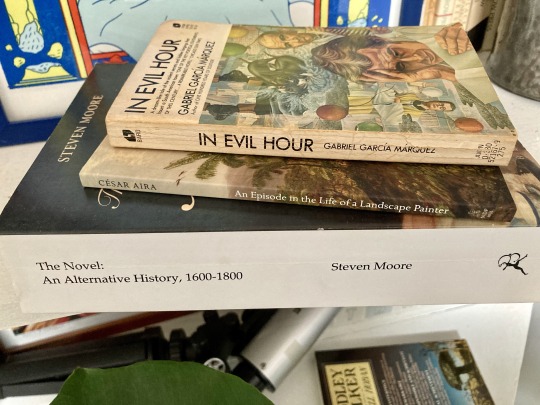
View On WordPress
2 notes
·
View notes
Photo

LOS AÑOS AIRA
Alberto Giordano
Ensayo Literario Argentino. Año 2022
ISBN 978-987-4430-26-7
Obra en tapa: Juan Hernández
Dosificado en entradas de diario, este ensayo autobiográfico de Alberto Giordano atraviesa más de tres décadas de amistad e intercambios literarios. Un encuentro inicial con el programa ético de César Aira a través de una entrevista de 1982, en la que declama: “Jamás utilizaría a la literatura para pasar por una buena persona”, un viaje a Buenos Aires con la misión —encomendada por dos jóvenes profesoras— de invitarlo a dar una conferencia sobre Arlt en Rosario, un viaje compartido a Lima, nacimientos, publicaciones, enfermedades, reconocimientos, la formación de bibliotecas personales, más visitas a Rosario, encuentros en bares, cartas y correos electrónicos.
Alrededor de Aira, Giordano esgrime una improvisación (que es, por definición, puro presente) movilizada por circunstancias cotidianas. A su tracción acuden anécdotas y documentos, de los que se sirve para edificar su mito personal: el de 1992 como “el año en el que ocurrió todo”.
Alberto Giordano nació en Rufino, en 1959, y vive en Rosario desde 1971. Es profesor y ensayista. Entre sus libros de ensayos se encuentran: El giro autobiográfico (Beatriz Viterbo, 2020), El pensamiento de la crítica (B V, 2015), La contraseña de los solitarios. Diarios de escritores (B V, 2013), Una posibilidad de vida. Escrituras íntimas (B V, 2006), Modos del ensayo. De Borges a Piglia (B V, 2005) y Manuel Puig. La conversación infinita (B V, 2001). Publicó además Volver a donde nunca estuve. Algo sobre mi padre (Bulk, 2020) y tres volúmenes con sus diarios, originados en posteos de Facebook: El tiempo de la convalecencia (Ivan Rosado, 2017), El tiempo de la improvisación (I R, 2019) y Tiempo de más (I R, 2020).
#ensayo literario#ensayo argentino#alberto giordano#césar aira#aira#neutrinos#edicionesneutrinos#rosario
7 notes
·
View notes
Photo
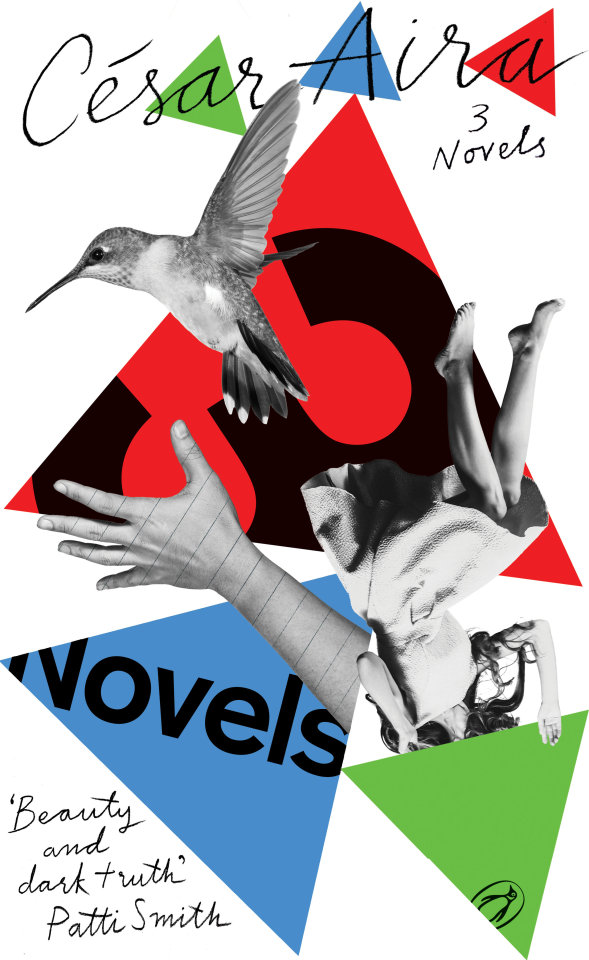
3 Novels
By César Aira.
Design by Jon Gray.
2 notes
·
View notes
Text
youtube
This seems like the most reasonable take on the news. As someone who actually likes The Counselor, I think it's too bad Ridley Scott, in full Alien: Covenant mode, isn't doing it; the novel should be adapted not as a western in genre but as retrospective horror-SF. (For me on Alien: Covenant in relation to César Aira's not-totally-un-McCarthy-like Ema, the Captive, see here.)
2 notes
·
View notes
Text
Como suele suceder con las iniciativas de la crítica, ésta mía tuvo en su origen el deseo de corregir una injusticia: la que veo en el uso tan habitual de algunas metáforas sentimentales para hablar de A. P. Casi todo lo que se escribe sobre ella está lleno de "pequeña náufraga", "niña extraviada", "estatua deshabitada de sí misma", y cosas por el estilo. Ahí hay una falta de respeto bastante alarmante, o un exceso de confianza, en todo caso una desvalorización. Lo cual no sería más que anecdótico si no apuntara, como siempre que se usa la metáfora, a una reificación, y como tal hace obstáculo a la visión del proceso. Reduce a un poeta a una especie de bibelot decorativo en la estantería de la literatura, y clausura el proceso del que sale la poesía, resultado muy corriente del trabajo de críticos que pese a las mejores intenciones parecen empeñados en congelar a la literatura en objetos. Y entonces no importa que el trabajo del escritor haya sido justamente descongelar el mundo, hacerlo fluir en una operación sin fin: su obra, y él mismo, terminan, en palabras de mis colegas, como una "pequeña estatua del terror".
César Aira sobre Alejandra Pizarnik (1996)
5 notes
·
View notes
Text
Leuchtende Bernsteine
Die verblüffenden Erzählungen des ungarischen Autors Dénes Krusovszky macht die Fragilität der Männlichkeit zwischen Fussballstadion und queerer Existenz sichtbar. »Das Land der Jungen« ist eines, in dem Ambivalenz die Eindeutigkeit schlägt.
Continue reading Leuchtende Bernsteine

View On WordPress
0 notes
Text
Pero ¿acaso alguna vez había dejado de hacerlo? Era el pago que le exigía su destino. Salvo que él no vivía su vida como una sola gran fuga, sino como una sucesión de pequeñas «obras de arte» del escapismo, sin un progreso visible de las primeras a las últimas. Su técnica había sido perfecta desde el comienzo. No tanto por mérito suyo como por lo que había de mecánico y fatal en la fuga.
—César Aira, El error
1 note
·
View note
Text
El viejo Síndrome de la Página en Blanco ha muerto. César Aira
El viejo Síndrome de la Página en Blanco ha muerto. Lo mató la computadora. Deberíamos alegrarnos, porque era una fuente de ansiedad y preocupación, un bloqueo creativo. Pero veo que no es tan así, porque los viejos usuarios del papel seguimos agenciándonos un ersatz del síndrome muerto, como si lo extrañáramos, abriendo un documento nuevo en el Word, y mirando, al menos por un instante, la…
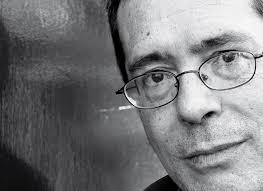
View On WordPress
1 note
·
View note
Text
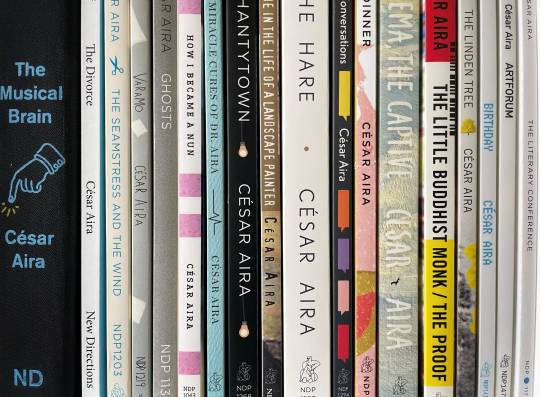
César Aira
He has published more than 100 novels, gives his work away, and his surrealist books have a massive cult following. Now Argentina’s favourite rule-breaker is tipped for the Nobel prize,
Daily inspiration. Discover more photos at Just for Books…?
2 notes
·
View notes
Text
La cárcel de papel.
La cárcel de papel la inventó el defensor del español de la revista La Codorniz (1941-78). Como título significa muy bien lo que quiere decir, textos que condenamos por falta o culpa contra alguno de los tres códigos: ortográfico, estilístico y tipográfico.
A quien primero vamos a condenar va a ser a ese colectivo editorial que se empeña en convocarnos al libro imprenta o libro de papel, esa…

View On WordPress
0 notes
Quote
El inmenso desorden de todos los cantos que sonaban a lo largo del día no se dejaba reducir a construcción alguna. Eran puntos sonoros salpicados en grandes o pequeñas curvas de aire solo momentáneas, biombos transparentes que no hacían más que multiplicarse. Esa estructura, había pensado [Martín], era la del tiempo. Porque el canto de los pájaros no sonaba cuando debía sonar, como era el caso de la música. Sonaba a veces, en el tiempo, mientras la gente simplemente vivía y hacía sus cosas. Salvo que el canto de los cantos, pensaba Martín, era el del gallo, el que reunía en el gran azar que producía todos los otros los dos planos de luz divergente, la noche y el día.
César Aira, Embalse (cap. I).
11 notes
·
View notes
Text
There is such an abyss between one story and the other, or between a story and the lack of a story, between the lived experience and the reconstruction | César Aira
Imagine a brilliant police detective summarizing his investigations for the husband of the victim, the widower. Thanks to his subtle deductions he has been able to “reconstruct” how the murder was committed; he does not know the identity of the murderer, but he has managed to work out everything else with an almost magical precision, as if he had seen it happen. And his interlocutor, the widower,…
View On WordPress
0 notes
